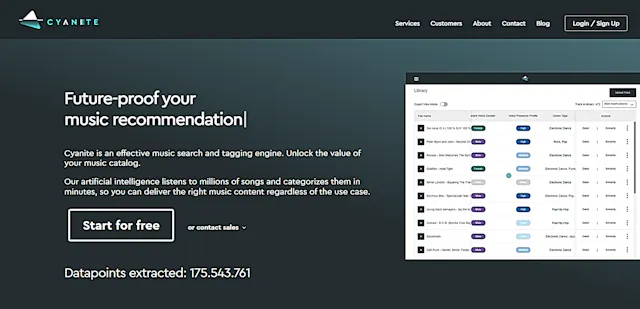
Cyanite.ai
What is Cyanite.ai?
Cyanite.ai is an innovative AI-powered tool designed to transform music tagging and discovery. It employs advanced algorithms to analyze and categorize songs, generating detailed tags for genre, mood, instruments, and more, streamlining the process of music management and search.
Top Features:
- Auto-Tagging: automatically generates comprehensive tags for songs, including genre, mood, and instruments.
- Similarity Search: finds music similar to a given reference track, aiding in music discovery.
- Free Text Search: allows users to find music using natural language descriptions and prompts.
- Visualizations: transforms complex musical data into easy-to-understand graphs and visual representations.
- Catalog Insights: provides a detailed overview of music libraries for data-driven decision making.
Pros and Cons
Pros:
- Accuracy: delivers precise and reliable tags for effective music categorization.
- User-Friendly Interface: offers an intuitive web app accessible to users of all skill levels.
- API Integration: easily integrates with existing catalog systems and software.
Cons:
- Learning Curve: some users might find the tool's advanced features initially challenging.
- Internet Dependency: requires a stable internet connection for optimal functionality.
- Pricing Structure: some features may be costly for smaller users or individual artists.
Use Cases:
- Music Production: streamlines workflows by automating song tagging for easier curation.
- Label Management: improves music management and licensing with detailed categorization.
- Composition Inspiration: helps composers discover similar music for analysis and inspiration.
Who Can Use Cyanite.ai?
- Musicians and Artists: individuals looking to effectively tag and categorize their work.
- Music Supervisors: professionals searching for the right music for visual media projects.
- Labels and Publishers: organizations needing efficient catalog management solutions.
Pricing:
- Free Trial: allows users to experiment with selected features at no cost.
- Pricing Plans: offers various tiers to accommodate different sized businesses and needs.
Our Review Rating Score:
- Functionality and Features: 4/5
- User Experience (UX): 4/5
- Performance and Reliability: 4/5
- Scalability and Integration: 5/5
- Security and Privacy: 4/5
- Cost-Effectiveness and Pricing Structure: 3/5
- Customer Support and Community: 4/5
- Innovation and Future Proofing: 5/5
- Data Management and Portability: 4/5
- Customization and Flexibility: 4/5
- Overall Rating: 4/5
Final Verdict:
Cyanite.ai stands out as a powerful tool for music tagging and search. It combines AI precision with user-friendly features, making it valuable for various music industry professionals. While pricing may be a concern for some, its capabilities justify the investment.
FAQs:
1) How accurate is Cyanite.ai's auto-tagging feature?
Cyanite.ai's auto-tagging feature is highly accurate, utilizing advanced AI algorithms to analyze and categorize music across multiple dimensions.
2) Can Cyanite.ai integrate with existing music management systems?
Yes, Cyanite.ai offers API integration, allowing it to work seamlessly with many existing catalog management systems.
3) Is Cyanite.ai suitable for individual artists or small labels?
While Cyanite.ai caters to various users, its pricing structure may be more suitable for larger organizations or established artists.
4) How does the Free Text Search feature work?
Free Text Search allows users to input natural language descriptions or prompts to find music that matches specific criteria or moods.
5) Does Cyanite.ai offer any visualization tools for music data?
Yes, Cyanite.ai provides visualization tools that transform complex musical data into easy-to-understand graphs and visual representations.
Stay Ahead of the AI Curve
Join 76,000 subscribers mastering AI tools. Don’t miss out!
- Bookmark your favorite AI tools and keep track of top AI tools.
- Unblock premium AI tips and get AI Mastery's secrects for free.
- Receive a weekly AI newsletter with news, trending tools, and tutorials.







